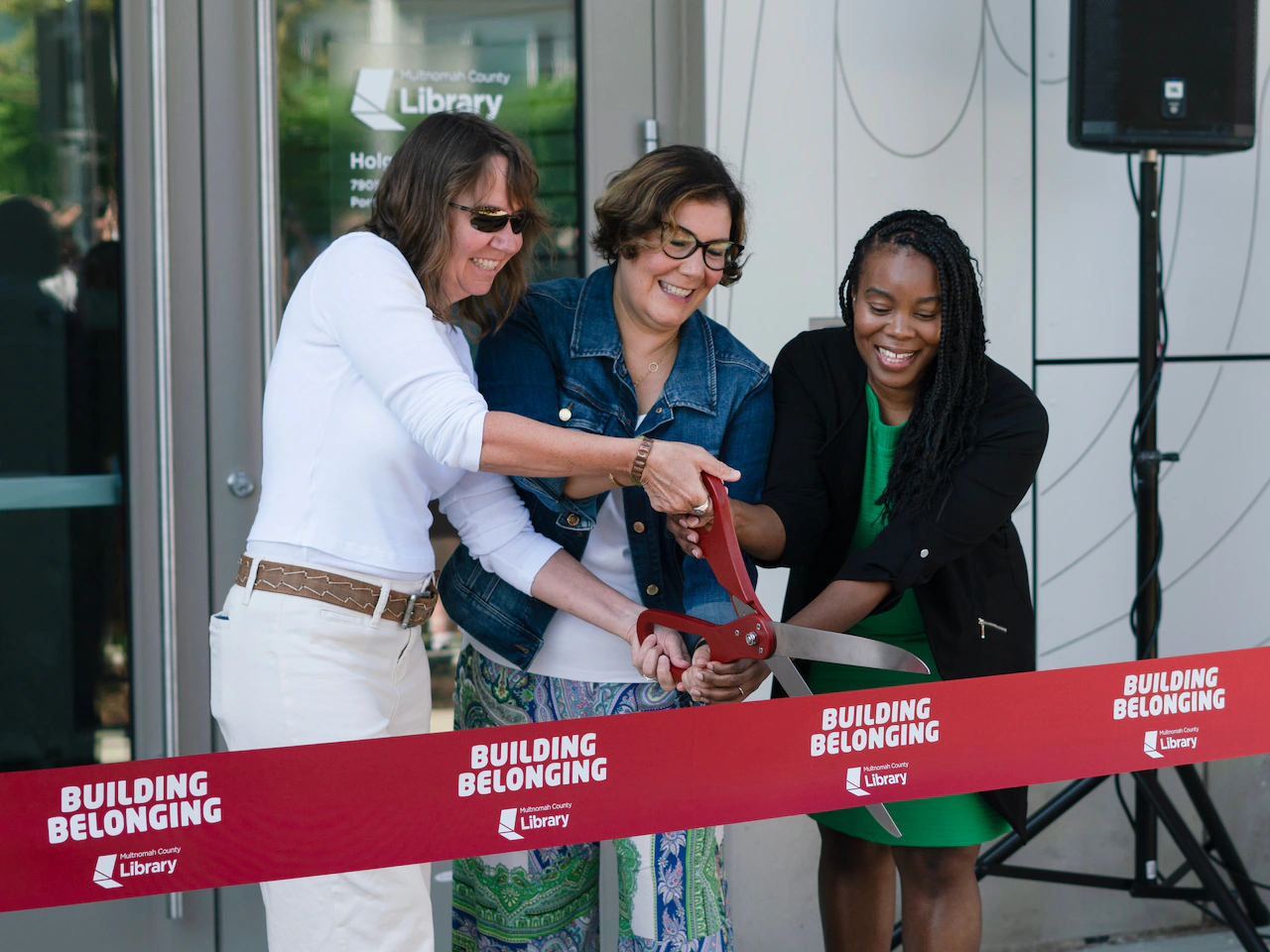Copyright The Oregonian

No one knows how much construction and demolition waste from recent Multnomah County library renovation and expansion projects was kept out of landfills, despite the county’s commitment to green building practices. That’s the upshot of a county audit released Thursday. It found that a waste hauler hired as a subcontractor on the Albina, Midland, North Portland and Holgate library projects reported recycling specific amounts of construction and demolition materials from the sites, despite failing to weigh the debris as required. Instead, the waste hauler’s employees simply eyeballed loads of waste arriving at the hauler’s facility, auditors found. “The waste hauler told us that typically the weights they reported for the individual streams were based on visual assessment of the loads prior to the waste going through the hauler’s typical sorting process,” auditors wrote. Multnomah County is seeking LEED certification for all four library projects, which were paid for with a 2020 voter-approved $387 million capital bond. One of the ways construction projects can earn points toward LEED certification, which recognizes buildings for meeting specific sustainability and energy efficiency standards, is to recycle large portions of their construction and demolition waste – at least 50% for one point and 75% for two points. The U.S. Green Building Council does not allow recycling figures to be based on “visual assessments” such as the ones the Portland waste hauler used on the library projects. Additionally, city of Portland code requires general contractors on all building projects over $50,000 to make sure at least 75% of solid waste generated by the projects is recycled. Multnomah County’s green building policy also requires the county to make sure contractors recycle at least 75% of waste on construction or major renovation projects. “To be a good steward of the environment, the county must ensure that recycling is actually occurring on its projects,” Multnomah County Auditor Jennifer McGuirk said in a statement. “I hope county leadership enacts my office’s recommendations to provide oversight and ensure that contractors and their subs are compliant with county recycling standards.” Multnomah County Chair Jessica Vega Pederson agreed with McGuirk that “wise and thoughtful stewardship of natural and public resources is core to our identity as a community.” But she pointed out in her response to the audit that the county was still on track to receive LEED certification for all four of the projects, thanks to dozens of points earned on other aspects of the buildings, such as energy efficiency. And Vega Pederson revealed that the city of Portland has stopped monitoring and enforcing compliance with the city code requiring 75% recycling rates on building projects within city limits. “While not an excuse for inaccurate reporting or insufficient oversight, these trends indicate the need for adjusting policy to be both ambitious and achievable, in addition to verifiable,” Vega Pederson wrote. Elliott Kozuch, a spokesperson for the city, was not immediately able to confirm whether the city had stopped enforcing the city’s construction recycling mandate. According to county auditors, the U.S. Green Building Council allows recycling rates for commingled demolition and construction debris to be obtained through two methods: either the recycler can measure each waste stream, such as drywall, and report those figures, or the LEED project team can use the waste sorting facility’s average recycling rate, as calculated by the local regulator. In 2024, the Metro regional government that regulates recycling put the recycling rate of the waste hauler that worked on the library projects at only 16.6%, according to auditors. Projects with high amounts of source separated recyclables, such as metal picked up from the worksite by a metal hauler, might be able to offset a small amount of commingled debris handled by a hauler with a 16.6% recycling rate and still achieve an overall recycling rate of 75%. But projects with higher amounts of commingled recycling would have difficulty earning LEED points if their commingled recycler only had a recycling rate of 16.6%. Auditors concluded that using the waste hauler’s 2024 Metro recycling rate, only the Albina library project would qualify for two points for recycling on its LEED application. The Midland library project would qualify for one point and the North Portland and Holgate library projects would not qualify for any recycling points on their LEED applications. Midland, North Portland and Holgate would also be out of compliance with the city’s code and county’s green building policy, auditors wrote. So far, the North Portland library has received LEED gold certification and the other library projects’ LEED certifications are still pending, county spokesperson Liz Sauer wrote in an email. The audit, which corroborated a tip submitted to the county’s good government hotline, did not identify the waste hauling company that reported the dubious construction and demolition waste recycling figures. But the tipster who submitted the complaint, Greenway Recycling CEO Terrell Garrett, said it involved a company called City of Roses Disposal & Recycling, or COR. That company’s CEO, Alando Simpson, is a prominent figure in Oregon’s sustainable business and political scenes. Simpson served for years as a member of the Oregon Transportation Commission. On Thursday, Simpson declined to comment on the county audit. “We have not reviewed the audit and cannot comment on its specific findings or any impact to our work,” Simpson wrote in an email. “At COR, we take recycling and sustainability practices seriously, and we work to divert materials from the landfill whenever feasible. Evaluating outcomes is an important component of any recycling project, and the process for measuring these outcomes varies from project to project.” Garrett, who has competed for years against City of Roses Disposal & Recycling for subcontracts on large government projects in the Portland area, told The Oregonian/OregonLive that he invested in getting his recycling facility’s rates verified by a third party and spent $7 million during the pandemic on a new machine to sort recyclables from waste. Garrett told the newsroom that City of Roses’ extremely high reported recycling rates on construction and demolition projects put Greenway Recycling at a competitive disadvantage. Garrett said he suspected that City of Roses was not basing its recycling reports on the actual weight of materials recycled, as required. County auditors’ findings confirmed that suspicion. “We encourage the county to follow through with the auditor’s recommendations and hope other government agencies will also investigate the misrepresentative reporting practices COR is using on their public projects,” Garrett said in a statement Thursday. Garrett has submitted similar concerns about City of Roses’ recycling practices related to its work on the city of Portland’s Columbia Boulevard wastewater treatment plant update, Portland Public Schools renovations, Port of Portland airport terminal projects and other public projects. A spokesperson for Portland Public Schools told the newsroom back in June that it was looking into Garrett’s concerns, but spokespeople for the district did not respond to a request for an update Thursday. A spokesperson for the Port of Portland previously told The Oregonian/OregonLive that Port leaders were confident they would meet LEED requirements based on source-separated recycling of materials, such as concrete and steel; a spokesperson did not respond Thursday to an inquiry on whether the county audit raised any additional concerns. At the city of Portland, Audit Services Division Director KC Jones confirmed Thursday that an investigation into Garrett’s complaint to the city hotline is ongoing. The problem of dubious recycling rate reporting on construction and demolition projects is not unique to Portland, a leader in the industry told The Oregonian/OregonLive earlier this year. Terri Ward, at the time executive director and CEO of the Construction & Demolition Recycling Association, said it was a problem across the industry. “Nobody tracks the loads, nobody weighs the loads as a rule,” Ward said in June. Ward said the high rates required for LEED points, which have been undergoing updates, and government mandates such as the city of Portland code, have incentivized recyclers to fudge the numbers. “Both of those factors have tended to incentivize or promote false reporting,” she said.



